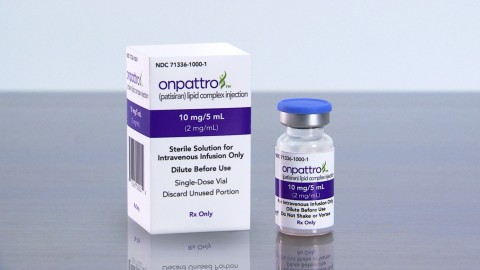
Alnylam’s gene-silencing drug Onpattro has been approved for the rare disorder hereditary transthyretin-mediated (hATTR) amyloidosis in Europe – but celebrations will be muted by ongoing debate about its price.
The EMA has cleared Onpattro (patisiran) – the first RNA interference drug approved in the EU – for adult hATTR amyloidosis patients with stage 1 or 2 nerve damage (polyneuropathy), one of the main symptoms of the disease. Alnylam won US approval for the drug earlier this month, but was promptly hit by an Institute for Clinical and Economic Review (ICER) report which suggested its price should be reduced more than 90% to offer value for money.
In the US, Alnylam has set a list price for Onpattro of $450,000 per patient per year, which it expects to reduce to $345,000 after discounts.
ICER’s position on Onpattro doesn’t bode well for Alnylam’s chances of securing reimbursement for the product in EU countries, which are generally much more price-sensitive than the US, but in Alnylam’s favour is that the ICER clearly backed the efficacy of the drug calling it a major step forward for the disease.
There’s one key difference between the US and Europe, however, as in the latter there are already two drugs available specifically to treat polyneuropathy caused by hATTR amyloidosis, providing some level of direct competition in the market.
Ionis and Akcea secured EMA approval last month for their antisense candidate Tegsedi (inotersen), but are still in the process of negotiating price and reimbursement with individual EU countries, while Pfizer’s Vyndaqel (tafamidis) has been registered in Europe since 2011 and costs in the region of $13,000 per month.
Neither Tegsedi or Vyndaqel are approved yet in the US, although Akcea and Ionis are due to hear from the FDA in October and Pfizer has said it hopes to file for tafamidis as a treatment for cardiomyopathy associated with hATTR amyloidosis after reporting positive results in the phase III ATTR-ACT trial.
“Until recently, patients diagnosed with hATTR amyloidosis faced an uncertain future,” says Professor Philip Hawkins of University College London Medical School.
“A lack of treatments to halt or reverse the progression of disease resulted in a gradual and inescapable decline in their day-to-day functioning, placing a heavy burden not just on the patient themselves but on their partners and families, many of whom end up being full time carers.”
The EU approval follows a positive recommendation from the EMA’s Committee for Medicinal Products for Human Use (CHMP), and is based on the APOLLO study, in which patients given an intravenous injection of patisiran every three weeks for 18 months showed slight improvements in nerve function measures such as motor strength, reflexes, sensation, nerve conduction and postural blood pressure, while patients on placebo saw a decline over the period.




